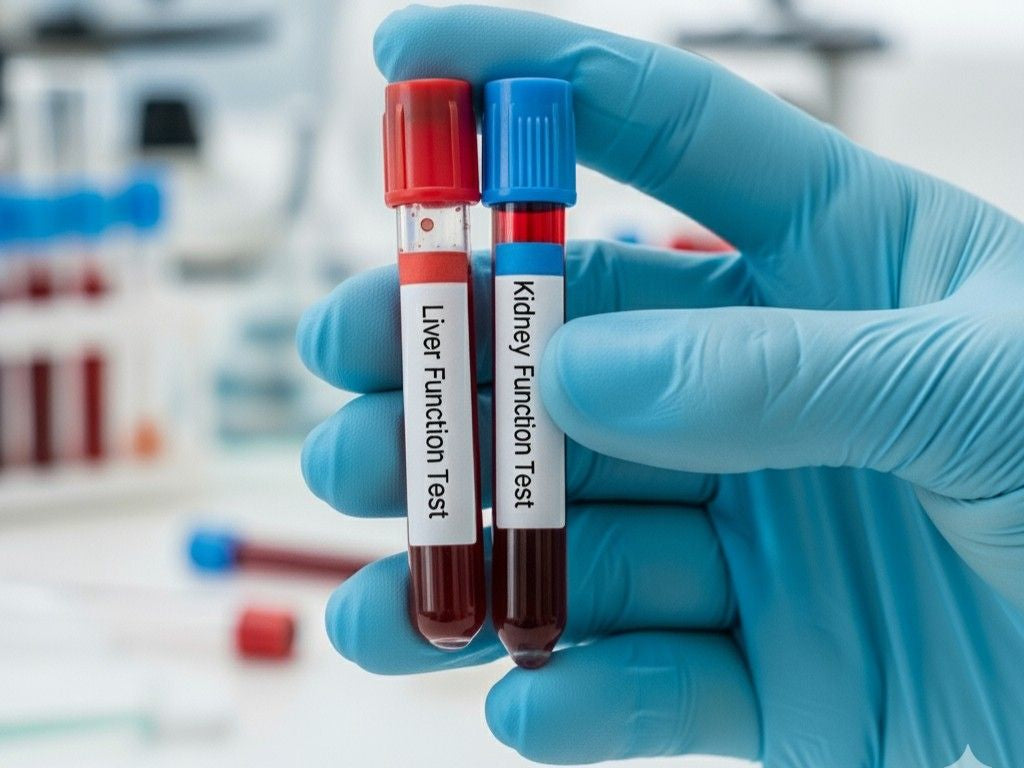Understanding Liver and Kidney Health: A Simple Guide to Essential Tests
 Written By
Blen Shumiye, MD
Written By
Blen Shumiye, MD

Your liver and kidneys play a vital role in keeping your body running smoothly. They filter toxins, balance fluids, support energy levels, and help you feel your best every day. You might not notice anything is wrong until changes appear, which is why checking your liver and kidney health is so important.
In this article, you’ll learn about the key tests used to monitor these organs, what your results can mean, and practical steps you can take to protect your health. By understanding your numbers and taking action early, you can stay proactive and empowered in managing your well-being.
Why Should You Check Your Liver and Kidney Health?

Your liver and kidneys are essential for overall well-being:
-
Liver: Breaks down toxins, stores nutrients, helps digest food, and supports blood clotting.
-
Kidneys: Filter waste, balance electrolytes, regulate blood pressure, and support red blood cell production.
Testing these organs is especially important because early disease often shows no symptoms. Routine checks can help detect conditions like fatty liver, hepatitis, or chronic kidney disease, giving you a head start on treatment.
What Are Liver Function Tests (LFTs)?

Liver function tests are blood tests that measure specific enzymes and proteins your liver produces. Here’s what they can tell you:
-
ALT (Alanine Aminotransferase): Detects liver cell damage.
-
AST (Aspartate Aminotransferase): Signals liver or muscle stress; comparing AST to ALT helps identify causes.
-
ALP (Alkaline Phosphatase): Indicates bile flow problems or blockage.
-
GGT (Gamma-Glutamyl Transferase): Often higher with alcohol-related or liver disease.
-
Bilirubin: High levels may cause yellowing of skin or eyes (jaundice).
-
Albumin / Total Protein: Shows how well the liver makes essential proteins.
-
Prothrombin Time (PT/INR): Measures blood clotting, reflecting liver function.
-
LDH (Lactate Dehydrogenase): A general marker for tissue damage.
When might you need liver tests?
Your doctor may order LFTs if:
-
You’re having symptoms like fatigue, abdominal pain, or yellowing of the eyes.
-
You drink alcohol regularly or take medications that stress the liver.
-
You live with conditions such as hepatitis, cirrhosis, or fatty liver.
-
You’re being monitored during treatment with drugs that affect the liver.
What can abnormal liver results mean?
Abnormal liver tests don’t always mean serious disease, but they provide important clues:
-
High ALT and AST: May suggest hepatitis or liver injury.
-
High ALP and GGT: Often linked to bile duct blockages or gallstones.
-
High bilirubin: Can indicate liver dysfunction or breakdown of red blood cells.
-
Low albumin: May reflect long-term liver disease, malnutrition, or kidney issues.
-
Long prothrombin time: Suggests reduced liver ability to make clotting proteins.
If you’re unsure about your enzyme levels, check out this guide on can high liver enzymes be dangerous
What are kidney function tests (KFTs/RFTs)?

Kidney function tests include both blood and urine checks that measure how well your kidneys are filtering waste and balancing your body’s chemistry.
Since kidney disease can develop silently, these tests are key for early detection especially if you have high blood pressure, diabetes, or a family history of kidney problems.
Which Kidney Tests Should You Know About?
Kidney tests help you understand how effectively your kidneys filter waste and maintain balance:
-
eGFR (Estimated Glomerular Filtration Rate): Shows how well kidneys filter blood. Lower values may indicate reduced function.
-
Serum Creatinine: Waste product from muscle metabolism; high levels can mean decreased kidney function.
-
BUN (Blood Urea Nitrogen): Indicates protein waste accumulation; high levels may signal kidney stress or dehydration.
-
Albuminuria / Proteinuria: Early signs of kidney damage, especially from diabetes or high blood pressure.
-
Urinalysis: Checks for protein, blood, or infection.
-
Cystatin C: Alternative marker for kidney function, sometimes more accurate than creatinine.
Many of these markers are included in routine basic metabolic panels (BMP) or comprehensive metabolic panels (CMP), which are commonly ordered during annual health checkups.
When might you need kidney tests?
Your doctor may suggest kidney function testing if:
-
You have diabetes or high blood pressure.
-
You notice swelling in your feet or face, or changes in urination.
-
You’re taking medications that can stress the kidneys (like NSAIDs or chemotherapy).
-
You’re over 60, when the risk of kidney disease rises.
-
You’re monitoring known kidney problems.
What can abnormal kidney results mean?
Kidney test patterns give doctors important insights:
-
High creatinine + low eGFR: Suggests chronic kidney disease.
-
High BUN but normal creatinine: Often dehydration.
-
Protein in urine: Early sign of kidney damage.
-
High potassium: May be dangerous and linked to kidney failure.
-
Low bicarbonate: May point to acid–base imbalance.
How Are the Tests Done?
-
Blood tests: A small sample is drawn, usually from your arm. Minimal discomfort and very low risk.
-
Urine tests: Can be a single sample or a 24-hour collection, depending on what’s being measured.
No special preparation is usually needed, though your doctor may recommend fasting or adjusting certain medications before testing. Results are typically available within a few days.
How to Understand Your Results
Liver Tests
-
Mild elevation: Could be temporary from alcohol, exercise, or medication.
-
Persistent elevation: May need follow-up testing, imaging, or specialist evaluation.
-
Low albumin / high PT: Suggests reduced liver function and requires closer monitoring.
Kidney Tests
-
eGFR below 60: Suggests chronic kidney disease. see what is stage 3 kidney disease.
-
Protein in urine: Early sign of kidney stress, even if eGFR is normal.
-
High creatinine or BUN: Indicates decreased filtration efficiency.
Always discuss your results with your healthcare provider—they can explain what the numbers mean for you specifically.
|
Test / Marker |
What It Means |
Why It’s Important |
|
ALT / AST |
Liver cell injury |
Detects liver damage, helps gauge severity |
|
ALP / GGT |
Bile flow or bone activity |
Distinguishes cholestasis from bone causes |
|
Bilirubin (Total/Direct) |
Processing and excretion of bile |
High levels lead to jaundice; clue to blockage |
|
Albumin / PT (INR) |
Liver synthetic function |
Low albumin or high INR indicates dysfunction |
|
Creatinine / BUN |
Waste clearance & hydration status |
Key kidney function indicators |
|
eGFR |
Estimated filtration capacity |
Standard measure for CKD staging |
|
UACR (protein in urine) |
Glomerular integrity |
Detects early kidney damage in high-risk groups |
|
Urinalysis |
Multiple indicators (blood, protein, infection) |
Adds context and helps catch early warning signs |
What Can You Do to Support Liver and Kidney Health?
The best “treatment” is prevention. Practical tips include:
-
Drink enough water.
-
Limit alcohol and avoid binge drinking.
-
Maintain a healthy weight.
-
Keep blood pressure and blood sugar in range.
-
Avoid unnecessary use of painkillers and supplements.
-
Eat a balanced diet with whole foods and less processed sugar and fat.
-
Stay active with regular exercise.
-
Get vaccinated against hepatitis A and B if recommended.
Even small lifestyle adjustments can make a big difference when paired with regular monitoring.
When to See a Doctor

While routine testing is valuable, certain symptoms or risk factors mean you should seek medical evaluation promptly:
-
Persistent fatigue or weakness that doesn’t improve with rest.
-
Yellowing of the skin or eyes (jaundice), which may indicate liver issues.
-
Swelling in the feet, ankles, or face, or unexplained weight gain.
-
Changes in urination, such as foamy urine, blood in urine, or decreased output.
-
Abdominal pain or swelling, particularly in the upper right side.
-
High blood pressure or uncontrolled blood sugar, which can strain both organs.
-
History of chronic conditions like diabetes, hypertension, hepatitis, or autoimmune disorders.
-
Medication use that affects the liver or kidneys, such as long-term NSAIDs, chemotherapy, or certain antibiotics.
Early consultation with a healthcare provider ensures timely diagnosis, appropriate testing, and effective management before complications develop.
Check our guide on symptoms of chronic kidney disease for more insight.
Final Takeaway
The liver and kidneys are critical to maintaining metabolic homeostasis, detoxification, and fluid–electrolyte balance. Routine assessment through liver and kidney function tests enables early detection of subclinical abnormalities, facilitating timely intervention and reducing the risk of progression to advanced disease. By integrating regular monitoring with evidence-based lifestyle modifications—such as optimal hydration, weight management, and control of comorbid conditions like hypertension and diabetes—patients and clinicians can work together to preserve organ function and long-term systemic health.
Next Steps
Understanding your liver and kidney health is empowering. Regular testing, combined with healthy habits, helps you catch issues early and maintain energy and vitality.
You can take charge today by exploring Ribbon Checkup’s at-home liver and kidney test kits, which make it easier to track your health from home.
Related Resources
References
AUCPDEV. (2025, February 18). Advanced Urgent Care of Pasadena. Advanced Urgent Care of Pasadena. https://www.pasadenauc.com/blood-tests-for-liver-and-kidney-health/
Blood tests used to investigate liver, thyroid or kidney function and disease. (2022, July 4). The Pharmaceutical Journal. https://pharmaceutical-journal.com/article/ld/blood-tests-used-to-investigate-liver-thyroid-or-kidney-function-and-disease
Clinic, C. (2018, January 5). Liver function tests are blood tests that measure different substances produced by your liver. Values that are higher or lower than normal may indicate disease. Cleveland Clinic. https://my.clevelandclinic.org/health/diagnostics/17662-liver-function-tests
Clinic, C. (2021, August 10). Kidney function tests measure how well your kidneys are working. They usually involve a blood test, 24-hour urine test or both. Cleveland Clinic. https://my.clevelandclinic.org/health/diagnostics/21659-kidney-function-tests
Liver and kidney test | Treatments & Procedures | Spire Healthcare. (2025). Spirehealthcare.com. https://www.spirehealthcare.com/treatments/blood-tests/liver-and-kidney-test/#:~:text=Checks%20the%20health%20of%20these,Before%20your%20treatment

Dr. Blen is a seasoned medical writer and General Practitioner with over five years of clinical experience. She blends deep medical expertise with a gift for clear, compassionate communication to create evidence-based content that informs and empowers. Her work spans clinical research, patient education, and health journalism, establishing her as a trusted voice in both professional and public health spheres.



